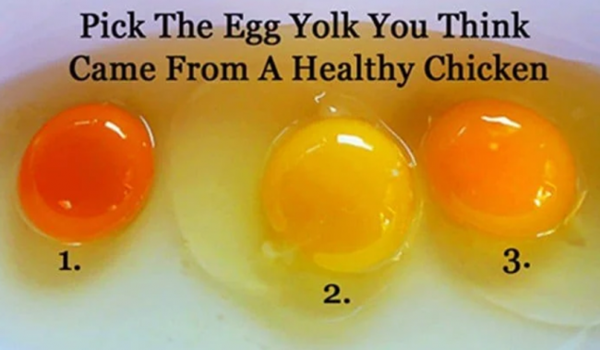Eggs are one of the best sources of protein, vitamins, and minerals we can consume, and they have impressive health credentials. They are a superfood, being high in vitamin A, folate, phosphorus, vitamin B5, B12, B2, selenium, vitamin D, vitamin E, vitamin K, vitamin B6, calcium, and zinc.
While there are lots of different types of eggs available, chicken eggs are most commonly raised. Yet, some of the other more gourmet alternatives include quail, goose, and duck eggs.
However, do you know to tell the difference between a healthy, all-natural chicken egg, and an unhealthy one, from a hen raised in poor conditions in a factory?
One of the things that can indicate the quality of the egg is the color of its yolk.
Here are some important tips that will help you:
- Egg With Dark Orange Yolk
If the egg has a dark orange yolk, it is extremely healthy, and probably from a chicken farm. These pasture-raised hens live in good conditions, freely roam the land, get access to green plants, and consume a well-balanced diet, rich in insects, ticks, spiders, crickets, and grasshoppers.
According to a Penn State study, eggs from pastured hens offer greater nutritional benefits, as they are richer in Vitamins A, E, and beneficial fatty acids than caged hens raised in a factory setting.
- Egg With Yellow Yolk
These eggs usually originate from commercial egg factories, and these hens do not have free access to the outdoors at all. They are fed only grains, and the eggs have been hatched from incubators. Their cages have artificial lighting, and they roam around a dimly-lit or darkened barn with no windows.
- Egg With Light Orange Yolk
These eggs come from local groceries, originating from chickens living on large chicken farms, in tolerable conditions, but their diet mainly consists of grains. Yet, there is one basic rule, the more chickens at the farm, the lower their quality.
Surprisingly, certified “organic” eggs might have a light yellow-orange yolk too, as their producers try to meet the outdoor access requirement for an organic label by giving their hens access to a small outdoor pen with a cement floor or dirt ground.
Therefore, the egg in the first image is the healthiest one. Eggs from chickens from local farms are fresh and extremely high in nutrients. What’s more, they even taste much better!
Therefore, enjoy them as often as possible!
At the supermarket, try to find eggs labeled “pasture-raised”, and don’t rely on terms like “free-range’, “organic”, or “vegetarian-fed”.
Organic eggs are from hens that have not been treated with antibiotics and have eaten organically-grown feed, free of GMOs and synthetic pesticides. Yet, this doesn’t mean that they have lived in appropriate conditions.
While the labels “cage-free” and “free-range” should indicate that the hen has had more space in the cage, this doesn’t have to be entirely true, as farmers can still confine these birds with very little or no access to the outdoors.
Yet, you can be sure that eggs that have a pasture-raised label, alongside the USDA Organic and Certified Humane labels or the Animal Welfare Approved label, come from a hen that has freely roamed the farm, ate bugs, spread its wings, and enjoyed the day in the dirt.
The following video will be of great help as well:


